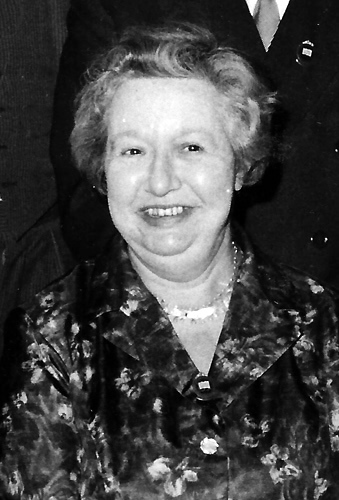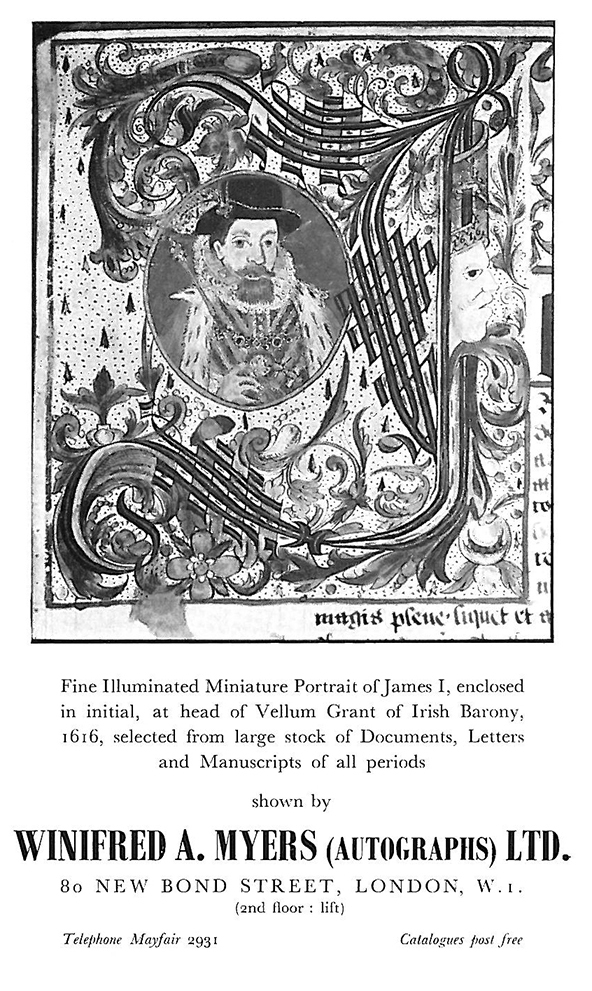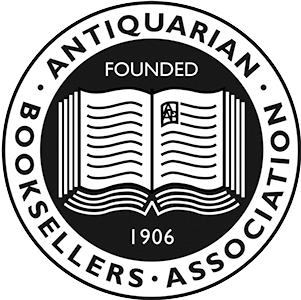Winifred Myers

Winifred Alice Myers (1909-1985) served as ABA president in 1950-1952. Robin Myers (no relation) writes:
Early Years: The Education of a Bookseller (1909-1928)
It was always clear to Winnie, as she was known, that she would go into the trade. Her father, the antiquarian bookseller, Albert Isaac (Ike) Myers (1865-1944), had no sons and Winnie’s elder half-sister, Phyllis May (1896-1966), daughter of Ike’s first wife who died young, was a semi-invalid all her life. Winnie, the daughter of his second marriage to Louise (Louie) (née Hess, 1869-1948), was a cousin of the pianist, Myra Hess.
Winnie, bright and bookloving, was destined to be her father’s heir. She grew up with books and manuscripts all round her and was a collector from an early age. Ike Myers believed that education was the key to success and he saw to it that his beloved Winnie had the best. He sent her to a private junior school in Willesden where the family lived, where she shone at everything except writing and needlework. From there she moved on, in 1921, to The North London Collegiate School (NLCS), then in Camden Town. The school, then as now, had the highest academic standards – its motto was spe laboramus (we work in hope). It also had a long tradition of service to the community, its Founder’s Day maxim being ‘to those to whom much is given, much is demanded’. It was just right for Winnie; she was very happy there, it fostered her love of books and her lifelong devotion to Socialism, feminism and egalitarianism. She remained loyal and generous to the school for the rest of her life.
Ike Myers had learnt his trade through apprenticeship before striking out on his own in 1879; but he decided that for his daughter a librarianship course, where she would learn cataloguing and historical bibliography, would be a better training. He enrolled her at University College, London. There she struck up a friendship with Clifford Maggs, scion of Maggs and Co; their friendship lasted the rest of their lives.
Winnie’s Private Collection and her Generosity
It was NLCS that inspired her private collecting. By the time Winnie left school, fewer of the girls lived locally and, moreover, the school had gradually expanded and was in need of larger premises. So in 1927, the year that Winnie left school, the Governors made the bold decision to buy a country house standing in extensive grounds on the site of the old palace of Canons. This had been built by James Brydges, 1st Duke of Chandos (1673-1744), who was Handel’s patron. In July 1921, a few years before the school bought Canons, Stowe House, the seat of the Dukes of Buckingham and Chandos (the family name was Brydges), was sold in an auction lasting eighteen days. It included the entire contents of the house and its estate papers, among them the archive of the palace of Canons. Most of the Canons material is now in the Huntington Library, California. Winnie was only eleven at the time of the sale and just starting school in Camden Town, her dealing and collecting days lay some years ahead, but in due course she started collecting Canons material - Lot 2379, on the twelfth day of the sale, was ‘A volume of most interesting original letters in the handwriting of Cassandra, Duchess of Chandos, beautifully written and of great interest. Quarto calf gilt, 1713-1735’. A few years later Winnie somehow acquired this and it got her collection off to a flying start. In due course she generously donated it to the school, where it has ever since been the jewel in the crown of its archive, exhibited to the girls and consulted by Canons and Handel scholars from all over the world.
Thereafter, it became Winnie’s custom to present the school with some choice and appropriate autograph item on each Founder’s Day in April, and she had intended to leave them her entire collection when she died. She was dissuaded from doing so by a hint that it would be sold off to provide for student bursaries. In 2004 Ruth Shepherd, who was Winnie’s heir, learnt that the school now had a designated archive room and a professional archivist, so the Canons collection would be safe there. She therefore fulfilled Winnie’s original intention by presenting her collection. It is now fully catalogued, safely housed, and made full use of for teaching purposes and for scholarly research.
Bookselling and Autograph Dealing (1928-1985)
Ike Myers had opened his first shop at 59 High Holborn in 1901, trading as Albert I. Myers, Antiquarian Booksellers. By the time Winnie joined him in 1928, he had moved to 102 New Bond Street. He died in 1944 and Winnie took over the business. In 1959 she moved farther down New Bond Street to No. 80. Ruth Shepherd (née Clark), recalled that in addition to the main shop, there was a basement filled with books and an office section where Ruth’s mother, Jean Clark, worked; there was a green leather sofa where customers could sit and chat and drink tea.
A photograph, perhaps taken soon after the move, shows Winnie, her half-sister Phyllis, and members of her staff standing round a table piled high with books, in the foreground a show case with the inevitable ash tray on the top (Winnie was a chain smoker).
Winnie had always been more interested in manuscripts and autographs than in general bookselling, so after a few years she gave up the ground floor shop and moved into an office higher up the building. Trading as Winifred A. Myers (Autographs) Ltd she saw customers and issued catalogues. Her file run of these were not merely marked with buyers’ names, but also annotated, sometimes with quite sharp comments. She was now one of the select band of autograph dealers. In the late 1960s she moved again, this time to an office in Dover Street and finally to St Martin’s Lane, close to Cecil Court, which in those days was practically a second Booksellers’ Row. Her staff consisted of Jean Clark, who had joined Albert I. Myers as a book keeper in 1942, Jean’s husband Trevor who came to them when he returned from war service and continued to work for Winnie until multiple sclerosis forced him into retirement. Over the years, the Clarks became almost family and their daughter Ruth almost a surrogate god-daughter. Ruth followed Winnie as a pupil at NLCS and her father, Trevor, was for a time a governor of the school. From the age of five, when Jean came to work for Ike Myers, Ruth spent her school holidays in the shop and practically grew up there. When Winnie’s secretary, Mrs Lucie-Smith (mother of the poet, Edward Lucie-Smith), took a long holiday in the Caribbean, Ruth filled in as temporary typist, then continued to work in the shop in the holidays, gradually learning the trade. When Winnie died in 1985, she left the business to Ruth.

Winnie’s Style of Dealing
It is now almost impossible to run a business in the relaxed way that Winnie did. Her desk was littered with letters, empty coffee cups, overflowing ashtrays. Customers were allowed to rummage at random in boxes, some items priced, others priced for the asking. Lists of purchases would be scribbled on odd scraps of paper there and then and the prices totted up in her head. A seeming vagueness masked profound knowledge of her field and considerable business acumen and Winnie could almost always find what was wanted among the chaos. No doubt she might have been richer if she had not considered profit to be less important than placing an item in the right hands, be it private or institutional. She encouraged and helped many a younger collector build up a collection by tempering her prices to the size of their purse. She would put aside likely items, and toss them into a box marked with the collector’s name, throwing in free of charge an engraved portrait which today would be sold separately at a high price. Then perhaps a discount might be given on the entire purchase. My own collection of letters relating to the book trade owes its origin entirely to Winnie’s encouragement, generosity, and enthusiasm way back in the 1970s.
She was very hospitable and made friends wherever she went. Good wine needs no bush and Winnie was known throughout the international trade, the library world, and to private collectors. She kept open house to librarians, collectors, and fellow booksellers in her hospitable and untidy flat in Addison House, Grove End Road, St Johns’ Wood.
Yet she also had quite a peppery side and could be quick to take offence, particularly disconcerting in one normally so kind and affable; but her anger subsided as quickly as it flared up. I got to know that an olive branch would always be accepted and she was only waiting for an excuse to restore good relations. I recall two incidents: on one occasion she misunderstood something I had done and it seemed to be the end of our friendship – some time later I tentatively sent her a card from abroad, she jumped at the excuse to restore relations and all was forgiven. On another occasion she sent me an angry letter to be passed on to the NLCS honorary archivist – a Malcolm Arnold notebook which she had given to the school had gone missing. When I later confessed I had not had the courage to do so, she said, ‘quite right, quite right’ and was mightily relieved.
Winnie and the ABA
Winnie was proud to belong to The Trade – for her it was not just a livelihood but a way of life. During all the years she served on the ABA committee she rarely missed a meeting. When the ABA held its first fair in the National Book League in Albemarle Street in 1958, she took a stall and continued to give her support when the fairs outgrew Albemarle Street and moved to the Europa Hotel. In 1961 she gave a talk at the National Book League on ‘How to collect autograph letters and manuscripts’. When air travel became universal, various national associations affiliated with ILAB, both in Europe and USA began organising book fairs and Winnie was often there. The ABA stall at the annual Jerusalem publishers’ fair in the early 1970s was Winnie’s initiative and especially gala – she arranged, with her friend and fellow Socialist, Teddy Kollek (1911-2007), five times Mayor of Jerusalem, for the ABA to have exhibition space in the middle of the fair. A group of leading members of the Association took part.
Winnie was popular with most of her fellow dealers and was readily accepted as her father’s daughter by the more diehard among them and, as the years passed, loved and esteemed for herself. She reached the pinnacle of her ambition when she was voted president in 1950-1952. She was only the second woman to be elected president and the only woman president for many years afterwards. Her father, who had been president in 1920, would have been proud of her. Yet, as the only woman ‘gov’ in a male-dominated world, she did not always have an easy time of it, and was hurt when she was from time to time excluded from the inner circle of dealers. It would not have helped that she was bitterly opposed to the ring which, though outlawed in the 1920s, still operated covertly among a number of the major dealers and which her father, the product of a less scrupulous age, would have made her aware of. Her disapproval, which she would never had hidden, would have made some of her male colleagues slightly wary of her.
The major dealers, Quaritch, Maggs, Francis Edwards, and a few more, all had their allotted, though unmarked places in the so-called pound at Sotheby’s, Christie’s, and Hodgson’s rooms. Woe betide any mere collector or newcomer to the trade, who sat in any of those hallowed seats. Winnie was a familiar figure in the rooms, sitting on the auctioneer’s right hand at Sotheby’s immediately below the rostrum, in the seat formerly occupied by her father. She always made it quite clear when she was bidding, and when she stopped – none of those secret signs for her, everything she did was above board.
The Krogers
The antiquarian book trade always found a niche for the unconventional or eccentric folk. When Peter and Helen Kroger arrived in London on New Zealand passports in 1954 and set up as antiquarian booksellers, they made themselves popular with everyone in the trade by their apparent friendliness and generosity. The trade, though in those days conservative and slightly xenophobic, was won over and made them welcome, never suspecting they were not who or what they said, but were Morris and Lona Cohen, Communist spies using dealing as a cover. When they were unmasked in 1961, the trade felt betrayed and very angry and cut them out of their lives – all except Winnie and Fred Snelling, Hodgson’s sale room clerk, who were both good-hearted and Left Wing. They kept up with the Krogers and visited them in prison. Fred described how he and Winnie, one boiling hot day, travelled up to Birmingham prison to see them. Winnie who was in those days rather overweight, laboured alongside the wiry, long-legged Fred, nearly expiring in the heat (later, in the 1970s Winnie went to Weight Watchers and lost 3 or 4 stone). When the British government arranged for the Krogers to be exchanged for English spies they went to Moscow and lived there for the rest of their lives, training spies. It seems strange that Fred and Winnie, both patriotically English, should continue to keep in touch with them, until after some time their letters were not answered and all communication ceased. (Winnie’s correspondence is now in the Imperial War Museum donated by Ruth Shepherd.)
Beyond the Trade
Winnie was active in Jewish causes and had been very devout in her younger days. Her father had helped a number of German Jewish booksellers to escape Nazi persecution in the 1930s. Winnie supported him by trying to find work for the women refugees when they got to England – no easy task in the Slump years, when these women were all restricted to domestic work for which, being mostly middle class professionals, they were entirely unfitted.
She visited pre-war Palestine where she made a film which she showed in talks to Jewish societies in England. She was a life member of the Jewish Historical Society, which combined her twin interests of Judaism and historical research, and was a pillar of its committee.
She was an ardent feminist who regretted having been too young to join the Suffragettes. She was on the committee of the Fawcett Society and gave many interesting letters by eminent women to its library, now the Women’s Library and part of the LSE library.
Winnie loved travelling. When war broke out on 3 September 1939, she was in Palestine and had quite an adventurous time of it getting back to England. After the war she went abroad regularly, for both business and pleasure. She went to South Africa a number of times, where she had many friends and relations. She made many business trips to American libraries, in the early post-war years, by sea. In the arctic winter of 1946/47, she and Jean Clark came back in January from a particularly successful buying spree in America. Ruth Shepherd recalled their triumphant return from Southampton to Bond Street in a pantechnicon, sitting in two armchairs, surrounded by piles of their purchases in an assortment of boxes and trunks.
Winnie died in 1985, leaving Winifred A. Myers (Autographs) Ltd to Ruth Shepherd who, after a few years, gave up the lease of St Martin’s Lane and issued catalogues from her Wimbledon home. She retired in 2004 and one of the great names in antiquarian bookselling and autograph dealing ceased to exist after 125 years.
After Winnie’s death Ruth Shepherd arranged a celebration of her life in the Chesterfield Hotel. Many of her contemporaries in the trade were there. Alan Thomas, tears pouring down his face, came forward and said, ‘she died in harness, it’s what we all hope to do’. Clifford Maggs, who had once been a bad stammerer, stood up and for several minutes, there was complete silence. Then he said, ‘I am sorry – to say so little – when I feel – so much’ and sat down. He spoke for us all.
Acknowledgements
I am grateful to Ruth Shepherd, Keith Fletcher, and Laurence Worms for information for this article; to Keith for the photograph of Winnie and the information about the Jerusalem book fair; to Henry Woudhuysen for information about Winnie’s marked set of her catalogues; and to Harriet Hansell, Society of Antiquaries Library and Liam Sims, University Library, Cambridge, special collections, for help in tracing copies of the Stowe sale.
Robin Myers (no relation), Honorary Member of the ABA, London, September 2017
